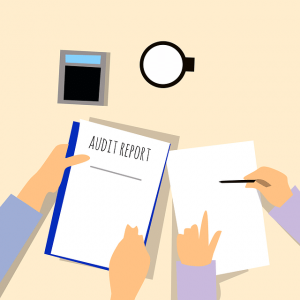What is a Tax Audit?
Once you file your income taxes, the IRS will review all the forms you submit (your tax return) and either accept your submission or reject and return it to you for a correction, usually with very little turnaround time. This can happen whether you are paying what you owe or receiving a refund. However, occasionally the IRS will decide to “audit” your tax return, asking you to provide some supporting documentation before your tax return is accepted.
The Basics of an Audit
An audit is what happens when the IRS chooses to examine your tax return more closely, verifying that your income and deductions are accurate. The auditing process is designed to catch errors in tax returns, verify that the correct amount of tax is being paid, and preventing fraudulent tax claims.
Can’t view on YouTube? Click Here
Getting Audited
Most audits are not a sign of wrongdoing; they are often triggered automatically by computer systems that flag returns with unusual deductions or income that doesn’t match the W-2s and 1099s the IRS receives. The vast majority of these are simple mail audits, where you’ll receive a letter asking for documentation to support something you claimed, like a specific credit or deduction. You then mail back the requested proof, and the matter is usually resolved.
The IRS generally has a three-year window from when you file to initiate an audit, though this can extend to six years for significant underreporting of income. In recent years, the IRS has received substantial new funding through the Inflation Reduction Act. The agency’s stated goal is to use this funding not to increase audits on average taxpayers, but to modernize its technology and focus enforcement on high-income individuals, large corporations, and complex partnerships where tax non-compliance is a larger issue.
Regardless of your income, the best way to prepare for a potential audit is to keep excellent records. You should hold onto all tax-related documents—receipts, bank statements, and forms—for at least seven years after filing. If you do receive an audit notice, remember you don’t have to handle it alone. Even if you prepared your own taxes, you have the right to hire a professional, like a CPA or an Enrolled Agent, to represent you and communicate with the IRS on your behalf.
What is suspicious about my return?

IRS auditing agents do not review every tax return. Most tax returns are processed automatically, with the data read, processed, and stored by a computer. Since all this data is in one place, the IRS has a research division that carefully combs through all the data to find statistical patterns. They use these statistics to build models of what most returns should look like, based on what the person is claiming. For example, returns filed by married couples with children look more similar than single people filing alone.
When returns are submitted and the information does not fall in line with what would be “expected,” that return gets flagged for an audit, and an IRS expert gives it a closer look.
What do auditors need?
If you get selected for an audit, the auditor will ask to see your financial records in order to verify that the claims you made on your tax return were accurate and justified. You should not need to generate any new records for an audit. Generally you will only need the same documents you used when completing your tax return. For example, if your tax return included a $1000 donation to a charitable organization, you will be asked to provide a copy of your donation receipt.
If you do need to submit any documents to the IRS, each document should include a note of what it is and how it applies to their request and your return.
Click here for a list of the records that auditors might request.
Steps of an Audit

There are two basic steps of an audit. When your return is first flagged for an audit, it is reviewed by an experienced auditor and analyzed in detail. This auditor can either accept your return as is or forward your paperwork to an examining group.
If the experienced auditor accepts your return with no changes, your paperwork will be processed normally, and you may not even be aware it was ever flagged at all. If it is forwarded to an examination group, you will be notified by mail of what exactly the auditors are looking into. You can be audited either in person or by mail. This is usually determined by the complexity of your return and how many flags were raised by the first auditor.
You will only be notified of an audit by mail. The IRS will never call you by phone to inform you of an audit or to demand payment. This is a very common scam
Audits by Mail
Audits by mail are very easy affairs. The paperwork you receive from the IRS will explain why you are being audited and what they are looking for, and you will be asked to mail specific supporting documentation, usually receipts, logs, or records detailing your expenses. You simply need to mail the IRS copies of those documents and they will review what you provide. (Never mail your original documents since they could be lost in the mail.)
Audits in Person
In-person audits are a more formal affair. You can be asked to come in person to a local IRS office, or an IRS agent may ask to meet with you at your home, place of work, or with your accountant. You will be asked to choose the date and location, which must be arranged with your auditor.
In-person audits are usually requested for more complex audits where several flags were raised with your return, allowing the auditor time to ask specific questions about specific items.
If you are contacted for an in-person audit, the IRS will still specify the reason why you are being audited and ask for specific documents, but it is always a good idea to bring as much documentation as possible to the meeting. Bring copies of your documents since the auditors may need to keep some of your records as they make their decision. They should not be given originals.
Auditing Results
After mailing your documentation or meeting with the auditors, the auditors reviewing your tax return will confer and discuss your paperwork and the information you have provided. You will always be notified when an audit has concluded and a decision has been reached.
The auditing team will either accept your return with no changes (meaning they were satisfied with the documentation you provided) or will request changes. You can either accept or reject their proposed changes.
If you accept the changes, you will sign a document confirming you understand and agree to the changes. This has the same effect as filing a revised tax return. If the revision means you owe additional taxes, you will need to pay them in full at this time or through installment payments.
If you reject the changes, you can request a conference with a higher-ranked IRS agent who will review the auditing process and your objections. If you disagree with this agent as well, you can take your case to mediation where a third party discusses the issues with both you and the auditing committee, or you can take your case to Tax Court where you will need a lawyer to argue your cause in front of a judge.
Very few disputes end in Tax Court since most taxpayers and the IRS prefer to resolve the issue through mediation rather than pursuing an expensive legal process.
Click Here for more information from the IRS website.
Challenge Questions
- What is a tax audit?
- What is an auditor?
- How are tax returns audited?
- In your opinion, should your taxes be audited?